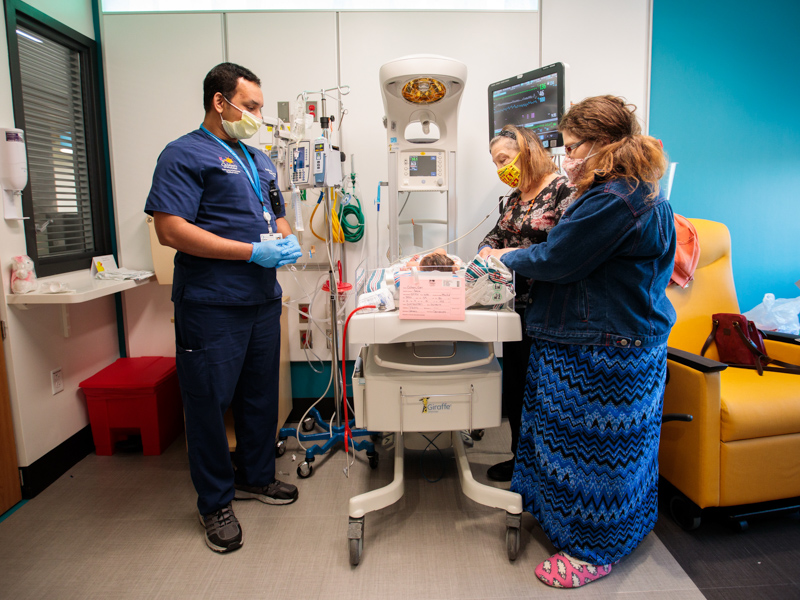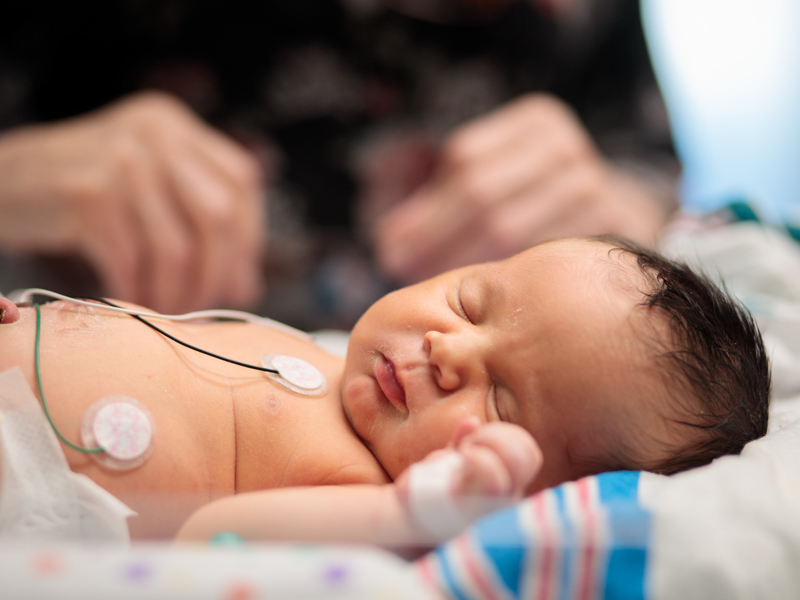More pediatricians, more specialized care: Children’s of Mississippi, UMMC working to make the special care pediatricians provide more accessible

Note: This article originally appeared in the Fall 2021 issue of Under the Rainbow, the semi-annual magazine for Children's of Mississippi.
When the babies Dr. Renjith Kalikkot cares for go home, he’s concerned.
A neonatalogist, Kalikkot cares for some of Mississippi’s smallest and most critically ill babies at Children’s of Mississippi. Some of these children go home to cities and counties without a pediatrician.
“As neonatologists, we take care of premature babies and babies with complex medical problems. Even after leaving the NICU, we need to make sure that they are receiving continued care.”
Pediatricians are trained in the specialized care of babies, children and adolescents. There are some areas where pediatricians have expertise over other types of primary care providers, said Dr. Jeffrey Crout, professor of pediatrics in the School of Medicine at the University of Mississippi Medical Center.
“In the feeding of infants, for example, or in vaccinations,” Crout said. “There are areas where pediatricians are experts because they specialize in caring for children from birth to young adults.”
Dr. Blair Batson, the first chair of pediatrics at UMMC, “used to say that 2 days is different than 2 months, and 2 months is different from 2 years, and that’s different than 18 years,” said Crout, who studied under Batson at UMMC. “Every age has different needs.”
New challenges
Pediatrics has changed since 1955, when Batson first arrived at UMMC. Children born at low birthweights may not have survived. Decades ago, surgeries to correct many congenital heart defects didn’t exist.
“Years ago, there wasn’t as much of a need for pediatric subspecialists because so many children with medical challenges then didn’t survive,” Crout said.
Today, neonatologists, pulmonologists, cardiologists and other pediatric subspecialists help children grow past medical crises to go home from the state’s only children’s hospital with their families.

Kalikkot wants to see babies continue to thrive after they leave Children’s of Mississippi, and that includes getting pediatric care plus pediatric subspecialty care close to home, through telehealth or at Children’s of Mississippi inside the clinical space at the Eli Manning Clinics for Children and the Kathy and Joe Sanderson Tower.
“We need to ensure that they are growing and developing appropriately while they receive continued care with their pediatricians and other pediatric subspecialists like pediatric neurology, pediatric surgery, pediatric cardiology, pediatric endocrinology and pediatric nephrology, among others,” Kalikkot said.
Unique needs
The needs of children who start life with medical challenges can be myriad.
“A significant number of these babies will need careful management of their nutrition and continued close monitoring of their neurodevelopmental progress,” Kalikkot said. “They will need therapies such as occupational therapy, physical therapy and speech therapy. Some of these babies go home on oxygen or home ventilator support that needs close follow up with the home ventilation team and pulmonology, in addition to continued nursing care and medical supplies at home.”
Children’s of Mississippi pediatric specialists follow babies who start life in the NICU through age 2 to monitor their progress and make sure they receive needed specialty care.
“If we are not able to provide their continued care, we won’t be able to ensure they grow and develop to their full potential, despite all the hard work we do in the NICU,” Kalikkot said.
“Pediatricians have a very significant role in the care of these babies once they leave the NICU,” he said.
Although Children’s of Mississippi follows up with NICU patients in a high-risk clinic, having a pediatrician near home can help ensure they get the care they need. This can include nutritional management, monitoring growth, immunizations and more.
“Pediatricians are able to provide a higher level of care,” Kalikkot said. “During residency, they rotate through the NICU and newborn nursery for several months, so they know the complex issues these babies face. Their focused training and knowledge make them capable of providing ongoing care for the complex issues these babies have.”
Is there a shortage?
According to the U.S. Bureau of Labor Statistics, 27,550 individuals identified as general pediatricians in 2020, and thousands more provide care to children as pediatric subspecialists.
Nationwide and in Mississippi, there are areas that are pediatric deserts, where there are few pediatricians or none.
Crout noted that often doctors choose where to practice based on personal reasons.
“Like anyone else, pediatricians may choose where they live and practice based on the amenities of the area, the quality of schools and the surroundings,” Crout said. “They may look at where they want to raise a family.”
At the state and national level, pediatricians are not evenly located. In Mississippi, there are 24 communities with only one pediatrician in the area. Larger cities like Hattiesburg, Biloxi and Tupelo have more – 55, 26 and 29, respectively.
The city of Jackson has the most pediatricians practicing, with 192, and its suburbs such as Brandon (60), Madison (122) and Ridgeland (48) have healthy numbers of pediatricians available to the families there.
The state has 932 pediatricians caring for its children. Those numbers aren’t adequate, said Dr. Anita Henderson, president of the Mississippi AAP Chapter.
“Less than half of Mississippi counties have an OB-GYN, and some don’t have a pediatrician, either.”
The American Academy of Pediatrics, on its website aap.org, notes that there is a shortage of pediatric subspecialists and pediatric surgical specialists.
“The AAP believes that the current distribution of primary care pediatricians is inadequate to meet the needs of children living in rural and other underserved areas,” the organization states, “and more primary care pediatricians will be needed in the future because of the increasing number of children who have significant chronic health problems, changes in physician work hours, and implementation of current health reform efforts that seek to improve access to comprehensive patient- and family-centered care for all children in a medical home.”
Specialty care close by
To bring specialty care closer to home for patients and their families, Children’s of Mississippi has opened specialty clinics across the state. Experts in pediatric subspecialties, including cardiology, neurology, pulmonology, orthopaedics and more, offer care at clinics in Tupelo, Meridian, Hattiesburg and Biloxi in addition to Jackson at the Eli Manning Clinics for Children and in the Kathy and Joe Sanderson Tower.
UMMC, recognized in 2017 as one of only two national Centers of Excellence in Telehealth, also offers care online and over the phone.
These efforts help, Kalikkot said, “to an extent.”
“Many of these doctor visits need hands-on assessment and care,” he said.
A pediatric home
The best-case scenario is for children to have a pediatric home, a clinic where they get care for sore throats and flu, where their weight and growth are monitored and where they get immunizations on schedule, said Dr. Mary Taylor, Suzan B. Thames Chair, professor and chair of pediatrics.
“Having that primary care provider who specializes in pediatric care is reassuring for parents and makes it far more likely that children will get needed care.”
UMMC works to educate the next generation of pediatricians and pediatric specialists and subspecialists. Along with research, education joins clinical care as the Medical Center’s three-pronged mission.
The number of pediatric residents at UMMC has grown to 16 each year plus about five to six internal medicine/pediatrics residents and a pediatric neurology resident.
Over the years, just over 50 percent of pediatric residents stay in Mississippi to practice once their residencies are complete. Why more don’t stay is a complex question, Crout said.
“Some go on to fellowships out of state, and some return to their home states or locate based on where their spouses are working,” he said. “We do like to grow our own pediatricians and hope that those who go on to fellowships will come back and improve health care for Mississippi’s children.”


